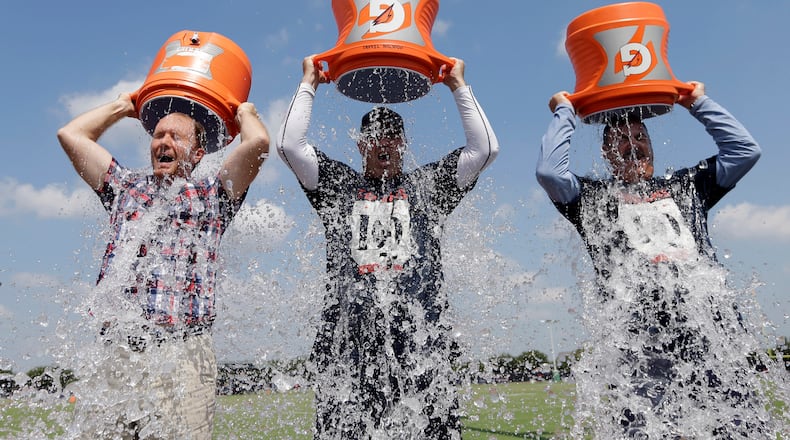The viral ice bucket challenge, which made quite the splash on social media more than a decade ago to raise money for ALS research and advocacy, is back.
In 2014, seemingly everyone was posting online photos and screaming videos as they got drenched in ice water as part of the viral online fundraiser.
Now people are once again soaking themselves for the latest version, dubbed the “Speak Your Mind” ice bucket challenge. But, this time, it’s to support mental health and suicide awareness.
If you’re suddenly seeing the ice-cold videos pop up again on your social media feeds, it’s thanks to University of South Carolina students who were just tweens or young teenagers the first time the trend blew up. The school’s Mental Illness Needs discussion group, which provides peer support on campus, renewed the challenge in late March via social media.
They are raising funds for Active Minds, a national nonprofit advocating for mental health awareness for teens and young adults. The organization has 20 Georgia chapters at several high schools and colleges throughout the state, including at Georgia Tech, and at Emory and Georgia State universities.
So far, the challenge has raised more than $238,000 to help equip those leading individual chapters with resources and tools to destigmatize mental health issues and to provide outreach to students, according to the fundraiser.
“The #SpeakYourMIND Ice Bucket Challenge is a launching point for us all to proudly commit our support to changing how mental health is viewed and prioritized in society and supporting the young people leading this crucial movement,” the Active Minds fundraiser says.
The amount raised so far is just a drop in the bucket compared to what the ALS campaign generated years ago.
The 2014 ice bucket challenge quickly became a viral hit, with athletes and celebrities joining in the trend and dousing themselves to raise money and awareness for ALS, a neurodegenerative disease that leads to paralysis. The challenge raised $115 million, according to the ALS Association.
In Atlanta, local notables were hot to participate, including Freddie Freeman, the Braves first baseman at the time, members of the Atlanta Hawks and former Georgia Tech football coach Paul Johnson.
A 2024 report found the social media fundraising “dramatically accelerated ALS research, improved access to care for people living with ALS, and increased government support for ALS programs,” according to the association.
While ALS still does not have a cure, researchers have identified the gene that causes the disease.
As for the resurgent ice bucket challenge, the ALS Association recently praised the use of the viral fundraising technique for mental health awareness.
“We’re thrilled to see the spirit of the ALS Ice Bucket Challenge live on in new forms of activism,” it said in a statement. But it noted that “ALS is still fatal, and we urgently need a cure.”
Mental health issues also affect those with ALS “in profound ways,” the group said.
“People living with ALS, their caregivers, and loved ones often face depression, anxiety, grief and isolation as they navigate a fatal disease that changes every aspect of life,” the statement said.
About the Author
Keep Reading
The Latest
Featured




